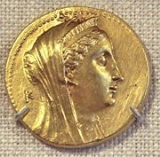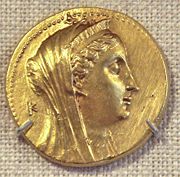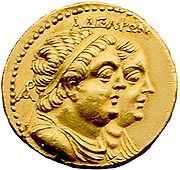
Arsinoe II of Egypt
Encyclopedia
For other uses see, Arsinoe

 Arsinoë II (Greek
Arsinoë II (Greek
:, 316 BC–unknown date from July 270 BC until 260 BC) was a Ptolemaic Greek Princess
of Ancient Egypt
and through marriage was of Queen Thrace
, Asia Minor
and Macedonia
as wife of King Lysimachus
(Greek: Λυσίμαχος) and later co-ruler of Egypt with her brother-husband Ptolemy II Philadelphus
(Greek: Πτολεμαῖος Φιλάδελφος, which means "Ptolemy the sibling-loving").
(Greek: Πτολεμαίος Σωτήρ, which means "Ptolemy the Savior"), the founder of the Hellenistic state of Egypt, and his second wife Berenice I of Egypt
.
Arsinoe II at the age of 15, married Lysimachus to whom she bore three sons: Ptolemy I Epigone, Lysimachus and Philip. In order to position her sons for the throne, she had Lysimachus' first son, Agathocles
, poisoned on account of treason. After Lysimachus' death in battle in 281 BC, she fled to Cassandreia
(Greek: Κασσάνδρεια) and married her paternal half-brother Ptolemy Keraunos
, one of the sons of Ptolemy I from his previous wife, Eurydice of Egypt
. The marriage was for political reasons as they both claimed the throne of Macedonia and Thrace (by the time of his death Lysimachus was ruler of both regions, and his power extended to Southern Greece and Asia Minor). Their relationship was never good. As Ptolemy Keraunos was becoming more powerful, she decided it was time to stop him and conspired against him with her sons. This action caused Ptolemy Keraunus to kill two of her sons, Lysimachus and Philip, while the eldest, Ptolemy, was able to escape and to flee north, to the kingdom of the Dardanians. She herself went to Alexandria
, Egypt to seek protection from her brother, Ptolemy II Philadelphus
.
 In Egypt, she continued her intrigues and probably instigated the accusation and exile of her brother Ptolemy II's first wife, Arsinoe I. Arsinoe II then married her brother; as a result, both were given the epithet "Philadelphoi" (Greek: Φιλάδελφοι "Sibling-loving (plural)") by the presumably scandalized Greeks. Arsinoe II shared all of her brother's titles and apparently was quite influential, having towns dedicated to her, her own cult (as was Egyptian custom), and appearing on coinage. Apparently, she contributed greatly to foreign policy, including Ptolemy II's victory in the First Syrian War (274-271 BC) between Egypt and the Seleucid Empire
In Egypt, she continued her intrigues and probably instigated the accusation and exile of her brother Ptolemy II's first wife, Arsinoe I. Arsinoe II then married her brother; as a result, both were given the epithet "Philadelphoi" (Greek: Φιλάδελφοι "Sibling-loving (plural)") by the presumably scandalized Greeks. Arsinoe II shared all of her brother's titles and apparently was quite influential, having towns dedicated to her, her own cult (as was Egyptian custom), and appearing on coinage. Apparently, she contributed greatly to foreign policy, including Ptolemy II's victory in the First Syrian War (274-271 BC) between Egypt and the Seleucid Empire
in the Middle East
. After her death, Ptolemy II continued to refer to her on official documents, as well as supporting her coinage and cult. He also established her worship as a Goddess, a clever move, because by doing this he established also his own worship as a God.
Arsinoe
Arsinoe , sometimes spelled Arsinoë, pronounced Arsinoi in modern Greek, may refer to:-Literature:* Arsinoe, a character in Le Misanthrope, a play by French playwright Molière...


Greek language
Greek is an independent branch of the Indo-European family of languages. Native to the southern Balkans, it has the longest documented history of any Indo-European language, spanning 34 centuries of written records. Its writing system has been the Greek alphabet for the majority of its history;...
:, 316 BC–unknown date from July 270 BC until 260 BC) was a Ptolemaic Greek Princess
Ptolemaic dynasty
The Ptolemaic dynasty, was a Macedonian Greek royal family which ruled the Ptolemaic Empire in Egypt during the Hellenistic period. Their rule lasted for 275 years, from 305 BC to 30 BC...
of Ancient Egypt
Ancient Egypt
Ancient Egypt was an ancient civilization of Northeastern Africa, concentrated along the lower reaches of the Nile River in what is now the modern country of Egypt. Egyptian civilization coalesced around 3150 BC with the political unification of Upper and Lower Egypt under the first pharaoh...
and through marriage was of Queen Thrace
Thrace
Thrace is a historical and geographic area in southeast Europe. As a geographical concept, Thrace designates a region bounded by the Balkan Mountains on the north, Rhodope Mountains and the Aegean Sea on the south, and by the Black Sea and the Sea of Marmara on the east...
, Asia Minor
Anatolia
Anatolia is a geographic and historical term denoting the westernmost protrusion of Asia, comprising the majority of the Republic of Turkey...
and Macedonia
Macedonia (Greece)
Macedonia is a geographical and historical region of Greece in Southern Europe. Macedonia is the largest and second most populous Greek region...
as wife of King Lysimachus
Lysimachus
Lysimachus was a Macedonian officer and diadochus of Alexander the Great, who became a basileus in 306 BC, ruling Thrace, Asia Minor and Macedon.-Early Life & Career:...
(Greek: Λυσίμαχος) and later co-ruler of Egypt with her brother-husband Ptolemy II Philadelphus
Ptolemy II Philadelphus
Ptolemy II Philadelphus was the king of Ptolemaic Egypt from 283 BCE to 246 BCE. He was the son of the founder of the Ptolemaic kingdom Ptolemy I Soter and Berenice, and was educated by Philitas of Cos...
(Greek: Πτολεμαῖος Φιλάδελφος, which means "Ptolemy the sibling-loving").
Biography
She was the first daughter of Pharaoh Ptolemy I SoterPtolemy I Soter
Ptolemy I Soter I , also known as Ptolemy Lagides, c. 367 BC – c. 283 BC, was a Macedonian general under Alexander the Great, who became ruler of Egypt and founder of both the Ptolemaic Kingdom and the Ptolemaic Dynasty...
(Greek: Πτολεμαίος Σωτήρ, which means "Ptolemy the Savior"), the founder of the Hellenistic state of Egypt, and his second wife Berenice I of Egypt
Berenice I of Egypt
Berenice I was a Greek Macedonian noblewoman and through her marriage to Ptolemy I Soter, became the first Queen of the Ptolemaic dynasty of Egypt.-Family:...
.
Arsinoe II at the age of 15, married Lysimachus to whom she bore three sons: Ptolemy I Epigone, Lysimachus and Philip. In order to position her sons for the throne, she had Lysimachus' first son, Agathocles
Agathocles (son of Lysimachus)
Agathocles was a Greek Prince who was of Macedonian and Thessalian descent. He was the son born to the diadochus Lysimachus from his first wife the Queen consort, Nicaea a daughter of the powerful regent Antipater...
, poisoned on account of treason. After Lysimachus' death in battle in 281 BC, she fled to Cassandreia
Cassandreia
Cassandrea, Cassandreia, or Cassandria was once one of the most important cities in Ancient Macedonia founded by and named after Cassander in 316 BC located on the site of the earlier Ancient Greek city of Potidaea...
(Greek: Κασσάνδρεια) and married her paternal half-brother Ptolemy Keraunos
Ptolemy Keraunos
Ptolemy Keraunos was the King of Macedon from 281 BC to 279 BC. His epithet Keraunos is Greek for "Thunder" or "Thunderbolt".He was the eldest son of Ptolemy I Soter, ruler of Egypt, and his third wife Eurydice, daughter of the regent Antipater. His younger half-brother, also called Ptolemy,...
, one of the sons of Ptolemy I from his previous wife, Eurydice of Egypt
Eurydice of Egypt
Eurydice was daughter of Antipater and wife of Ptolemy, the son of Lagus. The period of her marriage is not mentioned by any ancient writer, but it is probable that it took place shortly after the partition of Triparadisus, and the appointment of Antipater to the regency, 321 BC. She was the...
. The marriage was for political reasons as they both claimed the throne of Macedonia and Thrace (by the time of his death Lysimachus was ruler of both regions, and his power extended to Southern Greece and Asia Minor). Their relationship was never good. As Ptolemy Keraunos was becoming more powerful, she decided it was time to stop him and conspired against him with her sons. This action caused Ptolemy Keraunus to kill two of her sons, Lysimachus and Philip, while the eldest, Ptolemy, was able to escape and to flee north, to the kingdom of the Dardanians. She herself went to Alexandria
Alexandria
Alexandria is the second-largest city of Egypt, with a population of 4.1 million, extending about along the coast of the Mediterranean Sea in the north central part of the country; it is also the largest city lying directly on the Mediterranean coast. It is Egypt's largest seaport, serving...
, Egypt to seek protection from her brother, Ptolemy II Philadelphus
Ptolemy II Philadelphus
Ptolemy II Philadelphus was the king of Ptolemaic Egypt from 283 BCE to 246 BCE. He was the son of the founder of the Ptolemaic kingdom Ptolemy I Soter and Berenice, and was educated by Philitas of Cos...
.

Seleucid Empire
The Seleucid Empire was a Greek-Macedonian state that was created out of the eastern conquests of Alexander the Great. At the height of its power, it included central Anatolia, the Levant, Mesopotamia, Persia, today's Turkmenistan, Pamir and parts of Pakistan.The Seleucid Empire was a major centre...
in the Middle East
Middle East
The Middle East is a region that encompasses Western Asia and Northern Africa. It is often used as a synonym for Near East, in opposition to Far East...
. After her death, Ptolemy II continued to refer to her on official documents, as well as supporting her coinage and cult. He also established her worship as a Goddess, a clever move, because by doing this he established also his own worship as a God.
External Links
- Coin with her portrait
- Encyclopædia Britannica
- Arsinoe II entry in historical sourcebook by Mahlon H. Smith
Sources
- H. Bengtson, Griechische Geschichte von den Anfängen bis in die römische Kaiserzeit, C.H.Beck, 1977
- S.M. Burstein, "Arsinoe II Philadelphos: A Revisionist View", in W.L. Adams and E.N. Borza (eds), Philip II, Alexander the Great and the Macedonian Heritage (Washington, 1982), 197-212
- R.A. Billows, Kings and colonists: aspects of Macedonian imperialism, BRILL, 1995

